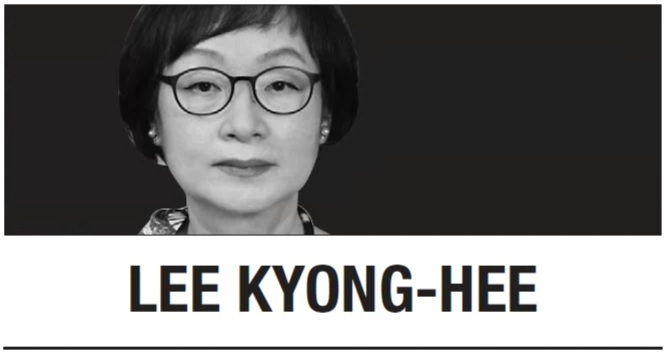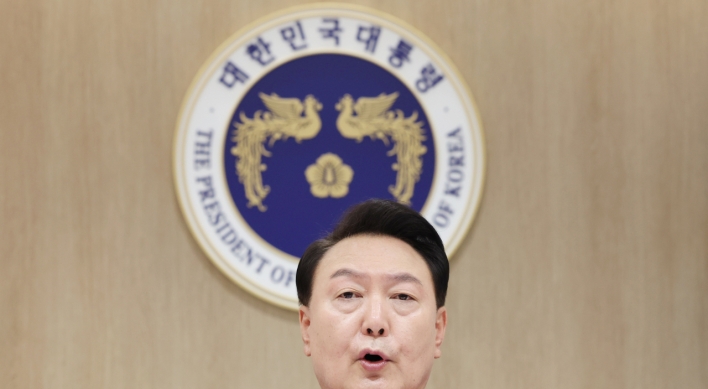[Lee Kyong-hee] Our humble hero on his anniversaries
By Korea HeraldPublished : July 8, 2021 - 05:31

At the time, retired Army generals ruled the nation with an iron fist, and they forbid news about anyone on their blacklist. My family was able to stay abreast of Kim Min-gi because he was a close friend of my younger brother.
Kim spent much of his 20s and 30s trying to be invisible because of a song that he wrote as a 20-year-old college freshman, “Morning Dew.” Its undertones of liberation and powerful melody received widespread attention, especially among the younger generation. Kim insisted that the song did not have a “subversive” aim, but the authoritarian rulers were unconvinced and unnerved. From then on, he was in their crosshairs.
Although the military junta prohibited broadcasts and live performances of “Morning Dew” in 1975, the song continued to spread like floating embers, igniting more and more fervor. It eventually became the anthem of pro-democracy activists calling for justice and freedom. But the song’s rise in stature also intensified the harsh treatment that befell Kim. He became a victim of his success.
The authorities never imprisoned Kim, but they meted out interrogations and torture numerous times as they kept him under tight surveillance. Hence, a talented art student brimming with self-confidence, strumming his guitar and writing songs with beautiful lyrics and melodies between painting, he found himself being ostracized by invisible hands.
Given little choice, Kim opted for whatever was available in a nomadic existence. He survived as a tenant farmer, factory worker, coal miner and laborer on a seaweed harvesting boat. It didn’t take long for his delicate guitarist’s fingers to become calloused and coarse.
Kim tried to stay away from music, but all of those years he spent in hiding led to songs about the everyday reality of his coworkers and neighbors, chronicling a critical juncture in Korea’s contemporary political history. And the songs he wrote in those dark days, some in another person’s name, inspired those engaged in democratic struggles -- up to the candlelight vigils in 2016 that ousted President Park Geun-hye. It is ironic that “Morning Dew” was often sung in Gwanghwamun Square on the windy winter days, just as it had been under the long military rule of Park’s father.
What clearly separates Kim from most former pro-democracy activists, though, is that he never joined any protest rally or ever once sang his songs in public. Most of those grim years in the 1970s and ‘80s he toiled quietly on rice paddies in the countryside, on the moonlit seas off a remote island, or at the blind end of coal mine galleries 2 kilometers under the ground.
In July 1987, days after the military regime finally agreed to democratic elections, Kim mingled with an overflowing funeral crowd on the plaza in front of Seoul City Hall. Hundreds of thousands of mourners were there to remember Lee Han-yeol, a university student who was killed by a tear gas canister shot by riot police. “For the first time I saw so many people singing ‘Morning Dew’ together with my own eyes,” Kim recalled in one of his rare press interviews a few years ago. “Nobody recognized me, but I couldn’t hold up my head. Watching the individuals each singing the song so earnestly and desperately, I realized that it wasn’t my song any longer.”
The December 1987 presidential election ushered in democratization, but Kim maintained a low profile. In 1991, he opened a small theater in the Daehangno area of Seoul with proceeds from the sales of his CDs and produced and directed musicals. The 188-seat Hakchon Theater is widely acclaimed as a “cradle of actors and singers,” though it has struggled to stay afloat.
Many of today’s top actors and singers were born through “Line 1,” the theater’s signature production. It is the Korean version of German rock musical “Linie 1.” Kim adapted the work, recognized as the second-most successful German musical after Bertolt Brecht’s “The Threepenny Opera.” He turned the Berlin metro line into a Seoul subway, and modified the story to reflect Korean circumstances in the 1990s, when ethnic Koreans in Yanbian, northeast China, began exchanges with the South Korean public after no contact since national division.
“Line 1” opened on May 14, 1994, and the curtain fell for its 4,000th performance on Dec. 31, 2008, during which time it attracted some 710,000 audience members -- a stunning milestone in Korea’s musical scene. From there, Kim decided to focus on children’s musicals, touring provincial cities over the next 10 years. He considered the effort to be more urgently needed, given the educational environment of Korean children. “There’s something one is supposed to do even if it doesn’t earn money,” he reportedly said. The commitment led to more debt and his health became more fragile.
“Line 1” reran twice: the first time in September to December 2018 and the second time in May and June this year. The final performance on June 27 was the 4,210th, a remarkable record in the history of the musical, which has been adapted in 15 countries since its 1986 premiere by the GRIPS Theater in Berlin.
I saw Hakchon’s 1,000th performance in 2000. One Sunday afternoon last month, I returned for this year’s revival. The production demanded total dedication and passion from the cast; 11 actors played 97 roles, accompanied by a five-person band. And no doubt it owes to the unconditional devotion and leadership of a man who has become a living legend in the 50 years since the release of “Morning Dew” and the 30 years since the opening of Hakchon.
Lee Kyong-hee
Lee Kyong-hee is a former editor-in-chief of The Korea Herald. She is currently editor-in-chief of Koreana, a quarterly magazine of Korean culture and arts published by the Korea Foundation. -- Ed.
-
Articles by Korea Herald










![[KH Explains] How should Korea adjust its trade defenses against Chinese EVs?](http://res.heraldm.com/phpwas/restmb_idxmake.php?idx=644&simg=/content/image/2024/04/15/20240415050562_0.jpg&u=20240415144419)








